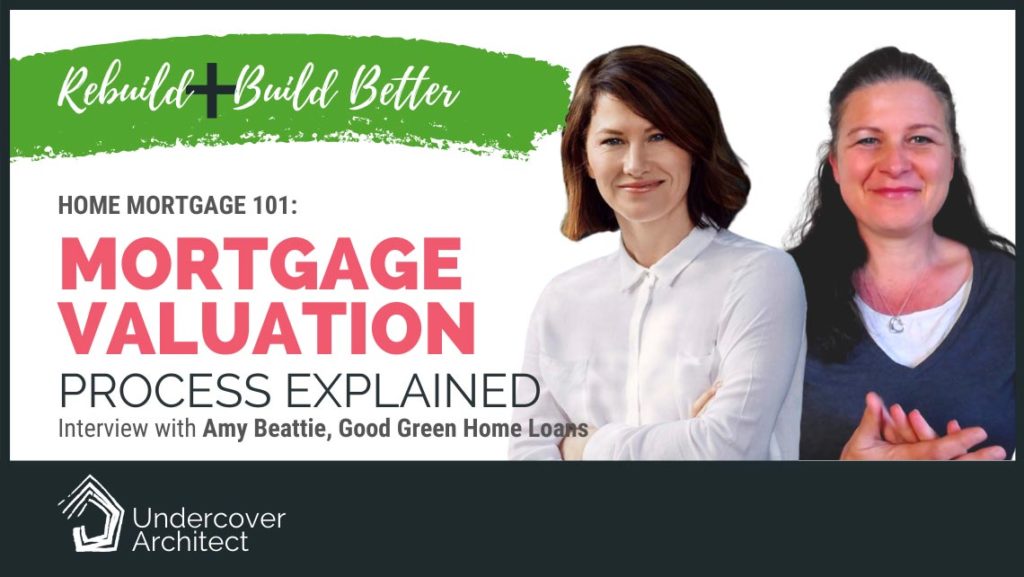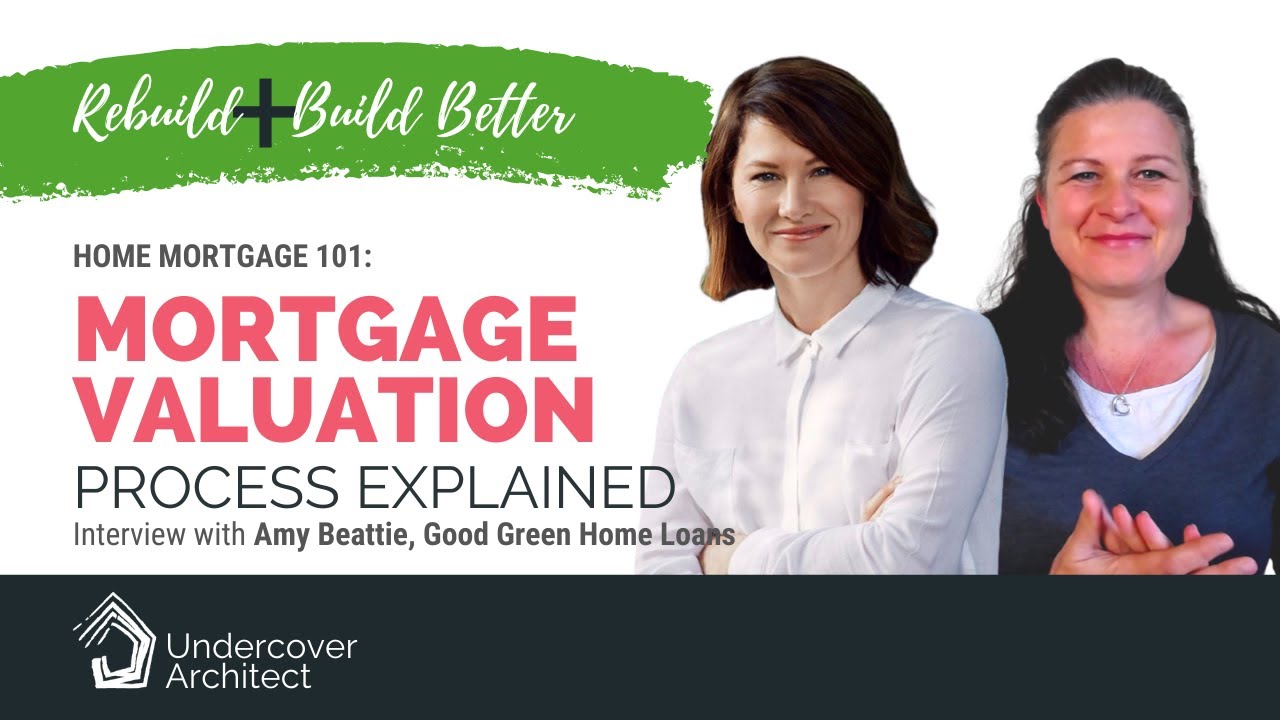
Want to hear the mortgage valuation process explained?
What do you do if your property’s zoning has changed since you purchased?
And did you know that banks and lenders can black-mark specific postcodes which makes it difficult to access finance?
Learn more as Amy Beattie, Mortgage Broker, helps us understand.
In this video, I speak with Amy Beattie, Mortgage Broker and owner of Good Green Home Loans.
This is part 5 of my conversation with Amy. You can watch Part 1 here and Part 2 here and Part 3 here and Part 4 here.
Good Green Home Loans is here to help you find the right home loan at a great rate – using only environmentally responsible lenders who aren’t using their profit and power to support the fossil fuel industry.
In this video, I asked Amy these questions:
- Many people may have bought land some time ago that has since been given a bushfire overlay. What do you suggest they do in regards to reviewing the finance options for building a new home on that land?
- How do you see banks black-marking specific postcodes or areas, and on what basis?
So let’s dive in.
INTERVIEW TRANSCRIPT
Amelia Lee + Amy Beattie (Good Green Home Loans)
[Amelia Lee]: In terms of, you know, what we were talking about earlier, some people may have bought land that now isn’t necessarily of the value that they might have paid for it, it might not have climbed in its value as much as they expected. It’s had the bushfire overlay.
[Amelia Lee]: They, you know, even I know some people who’ve owned land since pre 2009, when all of the rules were different. And they may or may not want to build a property on it and and now having to sort of navigate those different hoops and those different requirements than when they bought the land. what suggestions do you have for them in terms of thinking about finance and ascertaining if there’s going to be a gap
[Amelia Lee]: I suppose that just avoiding that surprise of, am I going to need extra cash to come up with? Obviously the research is one thing, is there? I mean, do you how do you suggest people sort of do that researchers of establishing value Do you have specific recommendations for people in terms of how they kind of established the value of the project?
[Amy Beattie]: You know, many banks will allow you to just order an upfront valuation without going down the finance side of the the assessment side of things at all, and they might pass that valuation cost on to you if you don’t proceed with something. And, but sometimes they don’t. And so you, you basically be wanting to go to your broker or direct to your bank and asking if they are able to do an upfront valuation for you. So you know exactly where you stand from a value point of view before you embark on your project, ultimately, so. So, so yeah, that’s that’s the short answer to that one.
[Amelia Lee]: And have you seen that scenario where people have you know, they’ve held land for some time they thought it was worth x. It’s not Sort of that, I suppose that balance and juggle of the project planning and how to obtain the finance that they ideally need to make that project happen.
[Amy Beattie]: I’m not really because it’s, you know, when it comes to property prices, the house haven’t really had many bumps, you know, in my lifetime. So, you know, land values have have been maintained for the most part historically. So these little kind of blips in values have just happened so infrequently. It’s it’s a really unknown space, I guess, and even more so now in the current climate. So it’s one of those things I guess, if, if, if you’re planning to do something with your land, you really need to be going and speaking to the experts sooner rather than later and getting valuations done.
[Amy Beattie]: Because who knows what’s gonna happen with property prices at the moment? So finding out the number and getting the answer that those upfront answers to your questions early is the best advice I can give. But no, I haven’t I haven’t seen that. I have I’ve, I’ve seen the odd, you know, off the plan purchase that’s come in and lower than was expected when, you know, the valuation was done three years before the project finished. But it’s a completely different kettle of fish. So, so no, not in relation to land. I haven’t specifically had to help somebody in that situation. Yeah, it’s gonna be more common.
[Amelia Lee]: Yes. And I suppose the only scenario that I’ve really seen it in is where a developer may have had a large subdivision, they’ve sold off early blocks to individual purchases, and then a builder may have come in and bought a, you know, section of 15 sites or something like that to do a punch of home and land packages, yet have been given a lower price per block of land as part of that deal, which is impacted the value of other sites in the development.
[Amelia Lee]: And, and so when it’s come to the point of financing, that’s then meant that there’s been a cash gap for the individual purchaser expecting that they would had better equity in the land to then be able to refinance and build the property on so it and I think to the bushfire overlay, it’s interesting to say I have not, I’m trying to think if I’ve seen any scenarios where it’s diminished the value of a property, but oftentimes those those sites that do have bushfire overlays, they, oftentimes in areas that have either great natural resources that improve the value of the property, or they’re in areas where they’re, the views are things like that, you know, maybe incredible or there’s other aspects that are Kind of prop up the value of the property.
[Amelia Lee]: And the bushfire overlay is just a constraint to deal with with construction, but not necessarily a constraint to deal with in terms of the valuation assessment. So, yeah, it’s quite interesting to say, but I think it is that thing of unless you’ve, you’re constantly saying across what are the constraints and zonings on your property, it can be a nasty surprise, when you go to the pointy end of kind of working through that project plan and finding out Hang on.
[Amelia Lee]: This wasn’t here five years ago, if you have been holding on to some land for some time, I’ve known people that have had land for a decade that they bought for, you know, peanuts or something like that. And yeah, it’s in some beautiful kind of remote location. It’s always been the plan to build a holiday shack or something. And yeah, and the area is full of holiday shacks. And unfortunately, Now none of them make code and so yeah, it’s a very tricky scenario.
[Amy Beattie]: So yeah, but again to that, like, the banks will have different rules around those things. Some banks will wipe out an area, just by Based on postcode, and there isn’t even a necessarily although maybe they weren’t provide you the reason why that postcodes wiped out. But it might be that it’s a mining area, and there’s it’s propped up by that industry, which is, you know, potentially not going to be a strong thing, you know, something that’s positive anymore. So, so speaking to a broker, who knows, with the breadth of banks that they’ve got access to that particular bank doesn’t bias based on postcode or doesn’t bias based on a particular overlay, and we’ll look at each transaction on its own merits means that with all of the banks that we’ve got to choose from, there’s very likely to be one that can help you.
[Amelia Lee]: So does that happen? Does it banks have got particular postcodes that they just won’t offer mortgages in our particular council kind of conditions that they won’t offer? Where do you say that sort of like you mentioned, the mining is there the sort of scenario That you see that happening in?
[Amy Beattie]: Well, you know, in places like the Docklands in Melbourne where there was, you know, the supply and demand factor and then also quality of builds and that type of thing meant that property prices there changed drastically, I guess from from the point of purchase for lots of people to not far down the track.
[Amy Beattie]: So, yeah, absolutely. And and all banks generally have also, most banks generally have a tool where you can go in and plug a postcode and it will spit out it, yes, we can talk to you. I know we can’t, and you don’t necessarily understand the factors behind it. And honestly, even with the mining factor, you’ll one bank will say no, and five banks will say yes, and it’s just about the risk appetite of the bank and, you know, whether they’re balancing their overall assets and what type of assets they want, and not Talking about the property assets that I’m talking about you as a client, they’re trying to boost their lending books, they might open, their postcode ranges, just simply because they want some strong borrowings overall and the postcode is one factor.
[Amy Beattie]: But if they’re borrowers with strong financial positions, the postcode doesn’t matter. So there’s, like you said at the start, there’s a cocktail of factors and, and it’s it’s dynamic, it’s changes daily. my inbox is just often emails from Bank saying we’ve changed this policy or change that policy or, you know, and there’s so much to keep abreast of and even sometimes, I won’t know what bank I can find that can help you until you come to me and present your circumstance and then I have to start doing the research for you. Because it just changes so often.
[Amelia Lee]: That’s fascinating. I’m thinking like this kind of back end, kind of Room have spreadsheets with all of this data in it, yes and knows against it and, you know, wish that it was transparently available to everybody to access because it would be it’s quite fascinating that it’s it’s not just about the risk profile of that particular area. But what the bank’s agenda might be in terms of its larger portfolio and its reporting to shareholders and its you know, balance sheets, and what it might even from a marketing position or a brand positioning want to be seen to be doing compared to another bank like that. That’s incredible.
[Amelia Lee]: It’s weird to think of all those permutations are going to impact you when you come with your individual house on an individual lot and say, Hey, I need some money. Yeah, and it’s like it’s got to fit into this kind of data stream of of yeses and noes in in one banks particular profile and portfolio. That’s just incredible.
[Amy Beattie]: Yeah, absolutely. And it’s and there are spreadsheets that exist like that. And you know, when you first approached me about taking part in the podcast, I, you know, the first thing I did was go to some of those spreadsheets and type in bushfire and the word doesn’t come up in the spreadsheets. So, you know, straight away that was saying to me, it’s not affect us specifically that the banks assess risk on, you need to dig further. And the further you dig, it all just comes back to that person’s individual circumstances and all of the different risk factors and hopefully, how many fall into the low risk category versus the high risk.
[Amelia Lee]: Yeah, it’s, it’s funny because you could get quite despondent about that and think, well, I’m never going to be able to know all of those puzzle pieces and then on the flip side, you can get quite made quite buoyant by it to go Okay, well, what I’ve got to do is just get what I can control in order, and what I can impact sorted in terms of my deposit, my knowledge, my Understanding I, you know, I had a friend for when I was at university who was a complete real estate junkie. And by the time we’d all finished uni, he’d already invested into one bedroom properties whilst we’re all spending our money on it.
[Amelia Lee]: But I’ll never forget him saying to me never send a valuer in blind amilia always be you know, fully informed about what you want that valuation to be and give them the homework you’ve done, to set them up to understand what you’re seeking to achieve. And so every time we’ve had a property valued, I’ve done a lot of that research and real estate background information and, you know, you go to your agent and get them to look at our pay data for you and, you know, all that kind of stuff. And it’s quite, it’s quite interesting because it’s such a significant asset and it’s such as in a renovation or a build is such a significant spend.
[Amelia Lee]: But so many don’t know those pieces of research to do or feel like they’re going to just have to pay for that extra information. But so much of this you can access through conversations with talented professionals who have your best interests.
[Amelia Lee]: Hot, you know, someone like you who’s can just then lay out to them. Okay, these are the risks. Can you say what you look like? I mean, at the end of the day, you’re a number to a bank. And this is what your number looks like. Yeah, what do we need to do to make your number look better and look less risky as a as a, as an option for the bank.
[Amy Beattie]: Exactly. And sadly, um, you know, with people directly affected by the bushfires. They’re not in a situation where their dream they’re dreaming about something they want in two or three years. It’s something they need help with now. So it’s, it’s not quite that simple on that side of things, but absolutely, that’s that’s exactly right. There’s, there’s so much in your control to drive the outcome. It’s just going to be a bit of time and effort and it doesn’t have to be cost.
THIS IS PART 5 OF MY INTERVIEW WITH AMY BEATTIE, GOOD GREEN HOME LOANS. WATCH PART 1 HERE AND PART 2 HERE AND PART 3 HERE AND PART 4 HERE.
This interview is part of our Rebuild + Build Better series.
Be sure to stay tuned as we share more information and expertise in helping you rebuild after bushfires, or build homes more resilient to climate conditions and in bushfire prone areas.
Resources mentioned in this video:
Get in touch with Amy here >>> https://www.goodgreenhomeloans.com.au/

 With over 30 years industry experience, Amelia Lee founded Undercover Architect in 2014 as an award-winning online resource to help and teach you how to get it right when designing, building or renovating your home. You are the key to unlocking what’s possible for your home. Undercover Architect is your secret ally
With over 30 years industry experience, Amelia Lee founded Undercover Architect in 2014 as an award-winning online resource to help and teach you how to get it right when designing, building or renovating your home. You are the key to unlocking what’s possible for your home. Undercover Architect is your secret ally
Leave a Reply